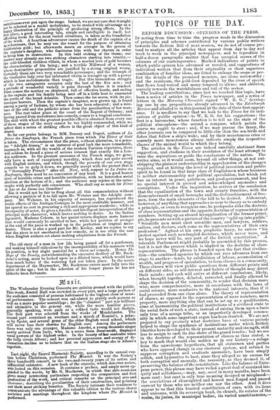Qtatru.
In the lives of celebrated individuals, we may sonietimes find the ap- parently paradoxical position, that a man considered as an entirety is eclipsed by one of his own brilliant qualities. The renowned Leasing, when he entered the arena as a theological controversialist, found the fact of his celebrity as a dramatist and a dramatic critic arrayed against him as a proof of incompetency in his new department. D'Alembert had two capacities, which reacted upon each other. He was styled a literary man among mathematicians, and a mathematician among literary men. It seems to be one of the vices of human nature that we shrink from giving our neighbours any great amount of versatility, and are less in- clined to believe in comprehensiveness than in superficiality.
Passing from individuals to dramatic entertainments, we see reason to fear that the new Adelphi melodrama of The Thirst of Gold will suffer in reputation from the very striking effect in the second of its frve tableaux. Everybody leaves the theatre deeply impressed with the wonders of a scene which first represents a plain of ice, and then tumbles and tosses about as a somewhat boisterous sea, with a little girl—the only sur- vivor of four persons—floating about on the solo remaining fragment of her former footing. The large sheet of ket cracking and shifting off in separate pieces—the father, mother, and friend, dropping through the stage, as the process of thawing advances—the sentiment of the little girl's position—all this makes up such an exciting picture, that though it occuM early in the course of a very long piece, the spectators, at the end of the performance, think of nothing else. In all probability, the friends at home, who hear flaming accounts of the Adelphi piece from the returned visitors of the theatre, imagine that it is a long affair, depending solely on one brief scenic effect.
It is therefore particularly necessary to defend the whole Adelphi piece against the injury it may receive from the excessive brilliancy of one of its parts. With the single fault of a little over-extension, it is one of the best melodramas ever put upon the stage. Indeed, we are not sure that itinight not be selected as a model melodrame, to be studied with advantage as a Nippy illustratioa of the principle of producing strong effects. In the find place, a good interesting tale, simple and intelligible in itself, but offeng room for the most varied situations, is taken as the foundation of the work. A heartless adventurer causes the death of the captain of a
merchantman, that he may use the vessel for the purpose Of obtaining odifornian gold ; but afterwards meets an avenger la- the person of the captain's daughter, who fascinates him with her charms in order
to bring him to destruction. a this bald etching of the theme, our readers may already see two striking characters starting into vitality,—
the cold-blooded ruthless villain, in whom a morbid love of gold becomes the characteristic of his being; and a terrible Millwood of a woman,
whose destructive propensities are justified by a strong original wrong.
certainly these are two very remarkable personages; and the triumph of the vindictive lady over her infatuated victim is wrought up with a power which is less melodramatic than tragic. But this tremendous struggle of the two antagonists occupies only the last of the five acts ; and g prelude of wonderful variety is gone through before it is reached. Brat comes the mutiny on shipboard, full of effective bustle, and ending in the captain and his family being sent off in a little boat to encounter the perils of the broad Atlantic. Then comes the ice scene, with its pic- turesque horrors. Then the captain's daughter, now grown up, is found among a party of Indians, by whom she has been educated ; and a mix- ture of the odd and the pathetic arises from the peculiarities of her man- ners. The rest takes place at the court of the Regent of Orleans ; and baying passed from melodrama into comedy, comes to a tragical conclusion. The skill with which the greatest possible effect is obtained from every one of these stages of the story cannot be too highly commended, when we reflect that a series of striking effects is the great object of this kind of drama.
So far our praise belongs to MM. Denney and Duple, authors of La Prit,re des Naufragea, the French piece from -which The Thirst of Gold is taken. The circumstance that the piece, without alteration, is a genu- ice "Adelphi drama," is an instance of good luck the more remarkable, inasmuch as, with all the wealth of the modern Parisian repertoire, there will seldom, be found a piece of serious interest that exactly fits a Lon- don audience. In the greatest successes of the French stage, we gene- rally have a sort of exceptional morality, which does not quite accord with English notions, and which, though the poverty of our own stage compels us to gulp it down, we generally accept with the protest that it is "thoroughly French" after-all. Now, with respect to _La Trare des Haufragis, there need be no concession of any kind. It is a good honest story of horrible crime and horrible retribution, with no heterodox social abortion at the bottom of it ; and the audience may rejoice at the catas- trophe with perfectly side consciences. Who shall say as much for Diane de Ly8 or La Dame our Candliast
But it would not be fair to fling about all this commendation without allowing a particle of it to fall upon Mr. Webster and the Adelphi com- pany. Mr. Webster, in his capacity of manager, has reproduced the scenic effects of the Ambigu-Comique in the most creditable manner, and has spared no cost in procuring a rich and appropriate wardrobe ; while in his capacity of actor, he gives a forcible and intelligent interpretation of the principal male character, which leaves nothing to desire. As the Indian ingenuite, Madame Celeste, in her quaint retorts displays more humour than would commonly be ascribed to her, while her position of avenger at the end of the piece is worked up to the perfection of tragical melo- drama. There is also a good part for Mr. Keeley, and we rejoice to say that the piece is not smothered in low comedy, as is too often the case when English authors set about making adaptations from the French.



































 Previous page
Previous page